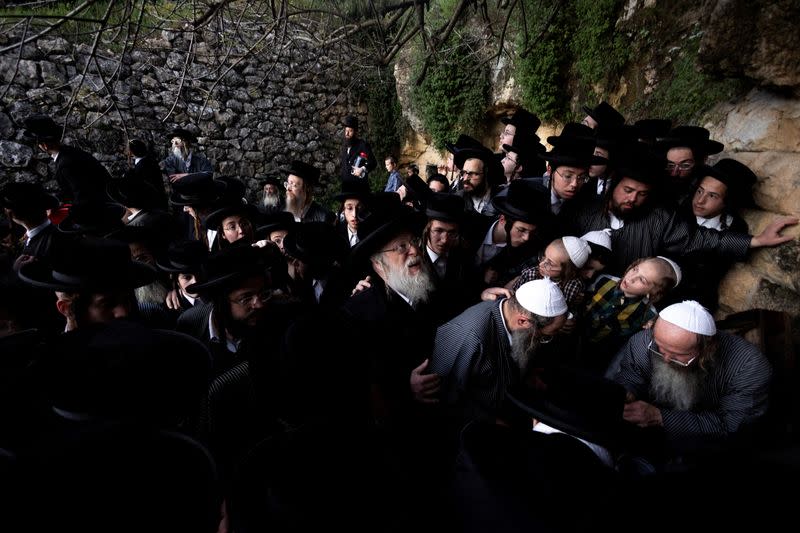Israel's Orthodox Haredim seek to avoid being pulled into national crisis
- Oops!Something went wrong.Please try again later.
By Jonathan Saul
RAMAT BEIT SHEMESH, Israel (Reuters) - As Israel's government pushes through judicial reforms that have convulsed the nation with mass protests and warnings of civil unrest, a core component of the fragile governing coalition has little interest in pursuing the policy.
The fast-growing Orthodox Haredi community is taking an ever-bigger place in Israeli politics, helping Prime Minister Benjamin Netanyahu hold a narrow parliamentary majority alongside far-right nationalist parties.
But while the community tries to focus on a spiritual life of religious study and observance, its pivotal role in the coalition means it is increasingly being drawn into national political issues it has traditionally sought to avoid.
Netanyahu's push to curb judicial powers is a main goal of his nationalist allies whose support allowed him to return to office last year. But it has also brought huge crowds onto the streets in opposition, warning that democracy is in danger.
For the Haredi community the crisis poses a paradox. As part of Netanyahu's government, their political parties will likely back the plans as part of an agenda that also includes their own policy priorities.
Yet they have lukewarm interest in the issue at the heart of one of Israel's most divisive ever disputes.
"There is a strong feeling of brotherhood within the Haredi state. That feeling of brotherhood is very much challenged by the wars of the Jews that are going on now," said Yehoshua Pfeffer, a rabbinical judge, legal scholar and a community rabbi in Jerusalem.
Some Haredi politicians even worry the crisis could derail their ambition to enshrine in law an exemption for their community from military conscription to allow their young men to study Judaism's sacred texts.
In Ramat Beit Shemesh, a Haredi city west of Jerusalem, Rabbi Isaac Shashua said his focus - like that of others in his community - was on studying the Torah.
After protests against the judicial law in an adjoining city, Shashua dismissed Israeli media's focus on the issue, saying the demonstrators "do not represent the whole country".
Some Haredi politicians suggest they may walk out of the coalition - which would bring down Netanyahu's government - if their priorities are not met, though it is far from clear whether that this is a serious threat.
"There is no reason to sit in a government which does not tackle this issue - this is from their viewpoint the first and last issue for why they signed up," Avraham Yustman, a lawyer who has represented one of the Haredi parties, told Reuters.
UNCHARTED TERRITORY
That transactional approach to politics, focused on issues such as conscription, should be paying dividends as the Haredi gain clout.
"The whole Haredi world is in some kind of watershed period because they are becoming larger and more powerful and with that should come responsibility which they have always shied away from," said Ofer Shelah, senior researcher at the INSS think tank and former parliamentary chairman of secular party Yesh Atid, which was previously in government.
"At the next Knesset, it is going to be the major question what the coalition is going to concentrate on – passing the laws intended for legal exemption for Haredim of military service or the continuation of the judicial reform."
The Knesset, Israel's parliament, has adjourned for recess, so it could be weeks before Netanyahu's future strategy becomes clear. Together with Haredi and nationalist partners he controls 64 of 120 seats.
The United Torah Judaism bloc of Haredi parties said last week that it "did not join the coalition to advance legal reform, but to settle the status of Yeshiva (religious seminary) students (in relation to conscription)", Israeli media reported.
SOARING POPULATION
As the Haredi community has reached 1.2 million people, or about 13% of the population, there has been friction with other Israelis over their current de facto exemption from conscription and other issues.
Secular Israelis have chafed at subsidising a community that has low employment, with about half its male members pursuing religious studies.
Among the Haredim - a Hebrew term that means "those who tremble before God" - there are also mixed views towards the Israeli state itself.
Many prefer to live in enclaves such as Ramat Beit Shemesh or bigger and older cities including Bnei Brak, close to Tel Aviv, even if it means putting up with crowding and creaking services.
A sizeable bloc, Eidah Chareidis, even refuses to recognise the state of Israel, boycotting elections and saying they should live separately from the secular and less observant community.
Within Netanyahu's coalition, there has been tension with far-right police minister, Itamar Ben-Gvir, over his visits to Judaism's holiest site, which they call Temple Mount and which Muslims also hold sacred as the Al-Aqsa mosque.
Haredi rabbis say Jews should not visit unless the ancient Jewish temple that once stood where the seventh-century mosque now stands is rebuilt.
"What is happening was foreseen by our sages over 70 years ago (before Israel was established). A mixed, progressive democracy does not work and what is happening is anarchy now," said Abraham Eisenstein, a leading Eidah Chareidis rabbi in the Beit Shemesh area.
(Reporting by Jonathan Saul, editing by Angus McDowall and Angus MacSwan)

